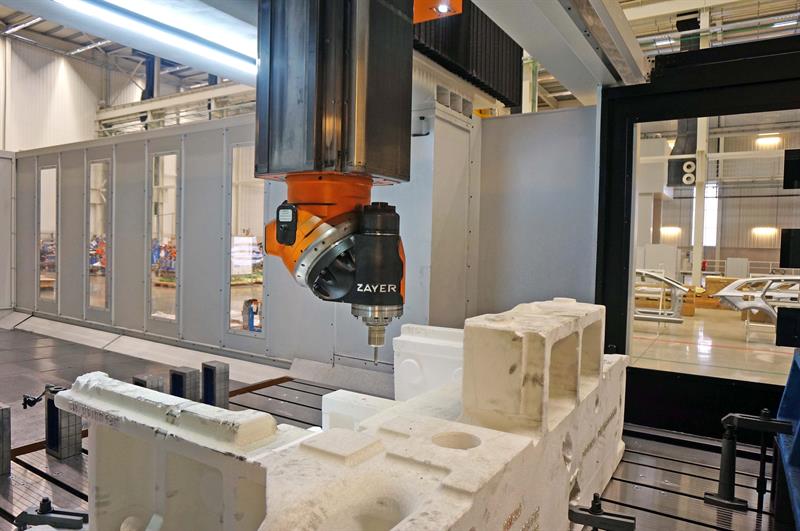Over the last 18 months, Asquith Butler has become the exclusive UK distributor for a range of machining centres from three European manufacturers: Zayer; Sahos; and Mubea Systems. The agreements cover machine sales, installation, commissioning and service support. Asquith Butler has already sold a number of these machines into the UK market, but the company points to two installations, in Bilbao and Barcelona, Spain, to highlight the Zayer brand’s automotive credentials.
At Audi Tooling’s new try-out centre in Barcelona, a Zayer Tebas 6000 completed acceptance in April 2014 within the firm’s 4,000 m² Tryout Center in Martorell, where it makes die sets for producing car body parts, trying them out prior to delivery to customers. The Zayer installation was complemented by the installation of three 2,500 tonne try-out presses.
 The Tebas 6000 at Audi Tooling
The Tebas 6000 at Audi Tooling
The new facility significantly enhances the quality and speed of support that Audi Tooling Barcelona provides to Audi’s production plants worldwide, as well as to its main customer, SEAT.
The 5-axis Tebas 6000, with accuracy and repeatability per 4 m travel of 8 and 5 micron, has two universal, automatic milling heads with 360,000 position location. One head is a 45° mechanical unit powered by a 45 kW German-made Kessler motor and offering spindle speeds up to 6,000 rpm, while the other is a 30° head with a 23 kW, 24,000 rpm electro-spindle for fine finishing cycles.
A key attribute is of the machine is its polymer concrete bed mounted on springs that prevent vibrations affecting the surface finish of the dies.
The fully enclosed machine has a 6,200 by 2,500 mm table and distance between columns of 3,500 mm. Travels in X, Y and Z are 6,000, 4,250 and 1,500 mm, respectively. Cameras are positioned under the cross beam and there are probes for tool measurement and for use with Zayer’s proprietary ICAL system for automatically calibrating the milling heads.
Control is by a Heidenhain iTNC 530 HSCI contouring CNC system with all-digital interfaces.
The second example is to be found at Batz, part of Mondragon, which is described as “the largest cooperative industrial group in the world”. The firm’s headquarters are in Igorre, 20 km from Bilbao, and 1,500 people are employed in more than 15 facilities worldwide.
Stamping dies have been produced since the company was founded in 1963. This was supplemented in 1982 by an automotive systems division for series production of vehicle components. More recently, the company has focused on new and lightweight materials, particularly for the aerospace industry, while renewable energy is another area of activity.
For its core business of stamping die manufacture, capacity issues meant that a dedicated machining centre was needed for finishing large dies; a Zayer Memphis 7000 high speed, 5-axis machining centre has been installed.
Longitudinal travel is 7,000 mm, distance between columns is 5,000 mm, and dies are fixtured on a table measuring 6,500 mm by 4,000 mm that can support 15 tonnes per m². Accuracy and repeatability are as per the Tebas machine.
The gantry-type Memphis was supplied with four spindle heads that can be automatically exchanged. One head is rated at 43 kW/6,000 rpm and there is a 30° head of the same rating offering 360,000 positions in 0.001-degree increments. An extended, L-shaped, 12 kW head is employed for machining awkward areas within dies at up to 2,000 rpm, while the fourth head carries a 23 kW electro-spindle capable of finish milling at speeds up to 18,000 rpm.










